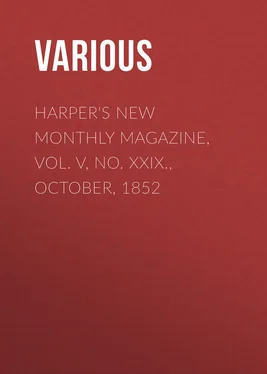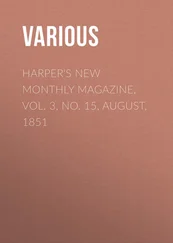Various - Harper's New Monthly Magazine, Vol. V, No. XXIX., October, 1852
Здесь есть возможность читать онлайн «Various - Harper's New Monthly Magazine, Vol. V, No. XXIX., October, 1852» — ознакомительный отрывок электронной книги совершенно бесплатно, а после прочтения отрывка купить полную версию. В некоторых случаях можно слушать аудио, скачать через торрент в формате fb2 и присутствует краткое содержание. Издательство: Иностранный паблик, Жанр: periodic, foreign_edu, на английском языке. Описание произведения, (предисловие) а так же отзывы посетителей доступны на портале библиотеки ЛибКат.
- Название:Harper's New Monthly Magazine, Vol. V, No. XXIX., October, 1852
- Автор:
- Издательство:Иностранный паблик
- Жанр:
- Год:неизвестен
- ISBN:нет данных
- Рейтинг книги:5 / 5. Голосов: 1
-
Избранное:Добавить в избранное
- Отзывы:
-
Ваша оценка:
- 100
- 1
- 2
- 3
- 4
- 5
Harper's New Monthly Magazine, Vol. V, No. XXIX., October, 1852: краткое содержание, описание и аннотация
Предлагаем к чтению аннотацию, описание, краткое содержание или предисловие (зависит от того, что написал сам автор книги «Harper's New Monthly Magazine, Vol. V, No. XXIX., October, 1852»). Если вы не нашли необходимую информацию о книге — напишите в комментариях, мы постараемся отыскать её.
Harper's New Monthly Magazine, Vol. V, No. XXIX., October, 1852 — читать онлайн ознакомительный отрывок
Ниже представлен текст книги, разбитый по страницам. Система сохранения места последней прочитанной страницы, позволяет с удобством читать онлайн бесплатно книгу «Harper's New Monthly Magazine, Vol. V, No. XXIX., October, 1852», без необходимости каждый раз заново искать на чём Вы остановились. Поставьте закладку, и сможете в любой момент перейти на страницу, на которой закончили чтение.
Интервал:
Закладка:
Various
Harper's New Monthly Magazine, Vol. V, No. XXIX., October, 1852
MEMOIRS OF THE HOLY LAND. 1 1 Entered, according to Act of Congress, in the year 1852, by Harper and Brothers, in the Clerk's Office of the District Court of the Southern District of New York.
How strongly associated in the minds of men, are the ideas of guilt and ruin, unspeakable and awful, with the names of Sodom and Gomorrah. The very words themselves seem deeply and indelibly imbued with a mysterious and dreadful meaning.
The account given in the Sacred Scriptures of the destruction of these cities, and of the circumstances connected with it, has, perhaps, exercised a greater influence in modifying, or, rather, in forming, the conception which has been since entertained among mankind in respect to the character of God, than any other one portion of the sacred narrative. The thing that is most remarkable about it is, that while in the destruction of the cities we have a most appalling exhibition of the terrible energy with which God will punish confirmed and obdurate wickedness, we have in the attendant circumstances of the case, a still more striking illustration of the kind, and tender, and merciful regard with which he will protect, and encourage, and sustain those who are attempting, however feebly, to please him, and to do his will. We are told elsewhere in the Scriptures, didactically, that God is love, and also that he is a consuming fire. In this transaction we see the gentleness and the tenderness of his love, and the terrible severity of his retributive justice, displayed together. Let us examine the account somewhat in detail.
"And the Lord said, Because the cry of Sodom and Gomorrah is great, and because their sin is very grievous,
"I will go down now, and see whether they have done altogether according to the cry of it, which is come unto me; and if not, I will know." — Gen. xviii. 20, 21.
There is a certain dramatic beauty in the manner in which the designs and intentions of Jehovah are represented in such cases as this, under the guise of words spoken. This rhetorical figure is adopted very frequently by the Hebrew writers, being far more spirited and graphic than the ordinary mode of narration, and more forcible in its effect upon common minds that are not accustomed to abstractions and generalizations. Thus, instead of saying, And God determined to create man, it is, And God said, I will make man. In the same manner, where a modern historian in speaking of the discovery of America would have written: Columbus, having learned that trunks of trees were brought by western winds to the shores of Europe, inferred that there was land in that direction, and resolved to go in search of it, a Hebrew writer would have said, And it was told to Columbus, that when western winds had long been blowing, trees were thrown up upon the European shores; and Columbus said, I will take vessels and men and go and search for the land whence these trees come.
The verses which we have quoted above, accordingly, though in form ascribing words to Jehovah, in reality are meant only to express, in a manner adapted to the conceptions of men, the cautious and deliberate character of the justice of God. "I have heard the cry of Sodom and Gomorrah, the cry of grievous violence and guilt, and I will go down and see if the real wickedness that reigns there, is as great as would seem to be denoted by the cry. And if not, I will know." In other words, God would not condemn hastily. He would not judge from appearances, since appearances might be fallacious. He would cautiously inquire into all the circumstances, and even in the case of wickedness so enormous as that of Sodom and Gomorrah, he would carefully ascertain whether there were any considerations that could extenuate or soften it. How happy would it be for mankind, if we all, in judging our neighbors, would follow the example of forbearance and caution here presented to us. It was undoubtedly with reference to its influence as an example for us, that the sacred writer has thus related the story.
In the same manner, how strikingly the narrative which is given of the earnest intercession made by Abraham, to save the cities, and of the apparent yielding of the Almighty Judge, again and again, to humble prayers in behalf of sinners, offered by a brother sinner, illustrates the long-suffering and the forbearance of God – his reluctance to punish, and his readiness to save. There is a special charm in the exhibition which is made of these divine attributes in this case, assuming the form as they do of a divine sympathy with the compassionate impulses of man. The great and almighty Judge allows himself to be led to deal mercifully with sinners through the pity and the prayers of a brother sinner, deprecating the merited destruction. The intercession of Abraham was after all unavailing, for there were not ten righteous men to be found to fulfill the condition on which he had obtained the promise that the city should be spared. The narrative, however, of the intercession, the final result of it in the promise of God to spare the whole monstrous mass of wickedness, if only ten righteous men could be found in the city, and the measures which he adopted, when it was ascertained that there were not ten to be found, to warn and rescue all that there were, give to the whole story a great power in bringing home to the hearts of men, a sense of the compassion of God, and the regard which he feels for human sympathies and desires. There is no portion of the sacred Scriptures which has more encouraged and strengthened the spirit of prayer, than the narration of the circumstances that preceded the destruction of Sodom and Gomorrah.
SITUATION OF THE PLAIN
Sodom and Gomorrah are described as the cities of the plain, and this plain is spoken of as the plain of Jordan. And yet the place where the cities are supposed to have stood, is near the southern end of the Dead Sea, while the Jordan empties into the northern end of it. If, therefore, the plain on which the cities stood was the plain of the Jordan, in the time of Lot, it would seem that the sea itself could not have existed then, but that the river must have continued its flow, beyond the point which now forms the southern termination of the sea. The sea as at present existing, is bounded on both sides by ranges of lofty and precipitous mountains, which lie parallel to each other, and extend north and south for several hundred miles. The space which lies between these ranges, forms a long and narrow ravine, very deeply depressed below the ordinary level of the earth's surface, as if it were an enormous crevasse, with the bed of it filled up to a certain level, in some places with water and in others with alluvial soil, either fertile or barren according to the geological structure of the different sections of it. This remarkable ravine divides itself naturally into five sections. The first, reckoning from north to south, contains the sources of the Jordan, and the lakes Merom and Tiberias. The second is the valley of the Jordan. Here the bottom of the ravine consists of a long and narrow plain of fertile land, with the river meandering through it. The third section is the bed of the Dead Sea. The waters here fill the whole breadth of the valley so completely, that in many places it is impossible to pass along the shore between the mountains and the sea. The water is deepest near the northern part of the sea, and grows more and more shallow toward the southern part, until at length the land rises above the level of the surface of the water, and then the bottom of the ravine presents again a plain of land, instead of a sheet of water. This is the fourth section. It extends, perhaps, a hundred miles, rising gradually all the way, and forming in summer the bed of a small stream which flows northward to the Dead Sea. This part of the great fissure is called the valley of Arabah. 2 2 Wadi Arabah.
At length the level of the bottom of the valley reaches its highest point, and the land descends again to the south, forming the fifth or southern-most section of the vast crevasse. The waters of the Red sea flow up some hundred miles into this section, forming the eastern one of the two forks into which that sea divides itself, at its northernmost extremity.
Интервал:
Закладка:
Похожие книги на «Harper's New Monthly Magazine, Vol. V, No. XXIX., October, 1852»
Представляем Вашему вниманию похожие книги на «Harper's New Monthly Magazine, Vol. V, No. XXIX., October, 1852» списком для выбора. Мы отобрали схожую по названию и смыслу литературу в надежде предоставить читателям больше вариантов отыскать новые, интересные, ещё непрочитанные произведения.
Обсуждение, отзывы о книге «Harper's New Monthly Magazine, Vol. V, No. XXIX., October, 1852» и просто собственные мнения читателей. Оставьте ваши комментарии, напишите, что Вы думаете о произведении, его смысле или главных героях. Укажите что конкретно понравилось, а что нет, и почему Вы так считаете.












